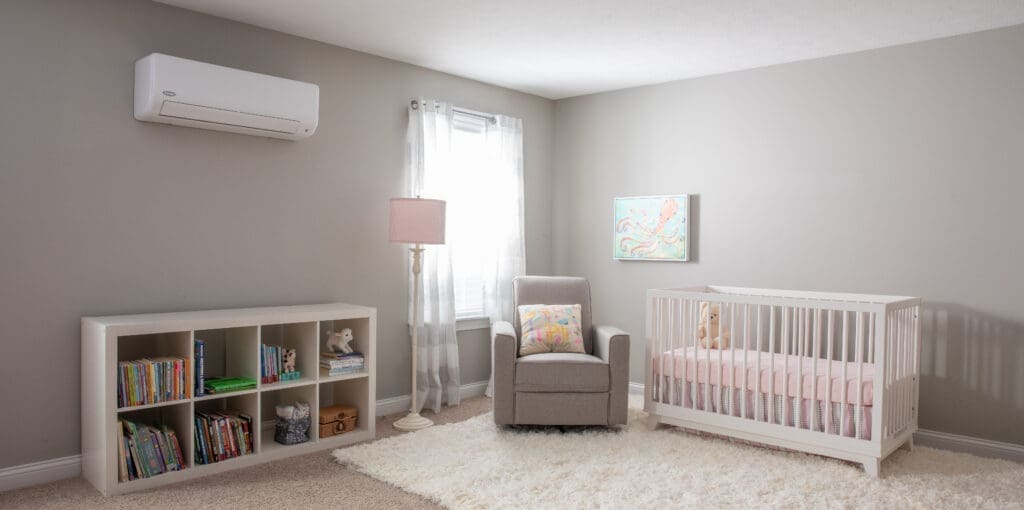What is a Ductless Mini-Split?
A ductless mini-split, also known as a mini-split air conditioner, is a type of heating and cooling system that doesn’t require ductwork to distribute air. This is great news for those who don’t want to install new ductwork.
The system is composed of two main components: an outdoor condenser and an indoor air-handling unit, which is connected by a conduit. Ductless mini-splits are highly versatile and very energy-efficient. This makes them an attractive option for homeowners and business owners looking to maintain ideal indoor temperatures without the infrastructure and expense of installing ductwork. In addition, the absence of ducts eliminates the potential for air leakage, improving indoor air quality and reducing energy waste. They are also amazing options for “man caves” and new home additions!
Ductless mini splits come in various sizes and cooling/heating capacities to fit different types of spaces. They are typically installed on a wall or ceiling and can be easily controlled with a remote or through a smartphone app. This allows for individualized temperature control in different rooms or zones, providing personalized comfort for each occupant. As a result, ductless mini splits are particularly popular in larger homes and commercial buildings with multiple rooms that have varying heating and cooling needs.
What Are the Benefits of a Ductless Mini-Split?
- Energy Efficiency: Ductless mini-split systems operate on less power compared to traditional HVAC systems, thereby contributing to energy conservation.
- Flexibility: These systems allow for more flexibility as they can heat, or cool individual rooms based on the occupant’s needs.
- Easy Installation: They require less time and effort to install because they don’t need ductwork.
- Improved Indoor Air Quality: These systems generally offer better air filtration, reducing dust, bacteria, pollen, allergens, and other particulates in the air.
One of the main advantages of ductless mini splits is their energy efficiency. Since they operate without air ducts, which can account for up to 30% of energy loss in traditional HVAC systems, they can save homeowners and businesses significant amounts of money on utility bills. Additionally, many ductless mini splits are equipped with advanced features such as inverter technology, which adjusts the speed and power of the compressor to maintain consistent temperatures while consuming less energy.
Another huge benefit of ductless mini splits is their easy installation process. Unlike traditional HVAC systems that require extensive ductwork, the installation of a ductless mini split is relatively quick and minimally invasive, especially when you hire a trusted, local professional like Five Star Home Services to perform the installation. In short, this makes them an ideal option for retrofitting older homes or buildings with outdated or inefficient heating and cooling systems. In addition, ductless mini splits don’t require large amounts of space for installation, as they can be mounted on walls or ceilings.

With the growing trend towards energy efficiency and sustainability, ductless mini splits are becoming increasingly popular. They offer a cost-effective and eco-friendly alternative to traditional HVAC systems, reducing energy consumption and lowering carbon footprint. In fact, some ductless mini-splits are even eligible for tax rebates or incentives from local governments or utility companies as part of their energy-saving initiatives.
Call us at Five Star Home Services for more information about the amazing benefits of installing a ductless HVAC unit.
A home evaluation by one of our local HVAC professionals at Five Star Home Services can help you determine whether this system is the most beneficial option for you. For a small, well-insulated house, a ductless mini-split system can be an excellent energy-efficient solution. In contrast, for a larger home with many rooms, a traditional ducted system might be a better choice. Always consider factors such as your budget, the size and layout of your house, and the quality of insulation before making a decision.

